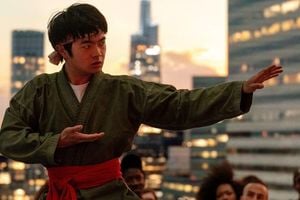College students across China have recently made headlines for their nighttime cycling excursions from Zhengzhou to Kaifeng, sparking both enthusiasm and concern. What began as a simple adventure to taste the famous soup dumplings of Kaifeng quickly transformed from spontaneous joy to something more contentious, capturing the attention of local authorities and stirring up discussions about youth culture amid economic strain.
This vibrant trend took off earlier this month when four female university students from Zhengzhou embarked on their bikes after classes, collectively thinking it would be fun to ride through the night to sample delectable dumplings before heading back the next morning. Excitedly chronicling their adventure on social media, the students inadvertently ignited what many are now dubbing the 'Night Riding Army,' as more and more students decided to join the movement.
A curiously large turnout was reported last weekend when approximately 200,000 cyclists converged on the main road leading to Kaifeng. Reports described the procession as congested with excitement, with participants cheering and some waving national flags, even singing the Chinese anthem en route. Despite their patriotic displays, observers noted the absence of explicit protest or political demands, reminding everyone of the carefree nature of their gatherings.
Local governments reacted swiftly to manage the unexpected rise in cyclists, leading to significant traffic disruptions. Authorities imposed curfews, shutting down universities for the weekend to prevent students from participating, citing safety concerns from the influx of unexpected riders. Bike-sharing services even went as far as locking bicycles if they were taken beyond city limits.
The pressure coming from governmental restrictions echoes the historical sensitivity to youth movements within China's political climate, particularly considering the substantial economic challenges young people face today. With rising rates of youth unemployment and stagnant wages, activities like these outings have become more than just leisure—they're also avenues for escapism and community, where young adults find solace amid uncertainty.
Kaifeng’s historic atmosphere played backdrop to this youthful trend, with the city, well known for both its history and its cuisine, suddenly becoming the focal point for thrilling escapes sought by students. Ironically, as the rides gained momentum, Kaifeng embraced the wave of enthusiastic visitors by opening its parks and scenic spots for free to students, initially seeming to welcome the excitement with open arms.
Concerns erupted online where commentators debated the wisdom of allowing such no-holds-barred gatherings. Some suggested the students had overwhelmed not only Kaifeng’s infrastructure but the local community as well, voicing frustrations over the challenges of accommodating throngs of enthusiastic young visitors.
Interestingly, what began as innocent fun revealed underlying tension embedded within these excursions. The requirement for many students to connect over shared experiences—the urge for public spaces to fill with laughter and music—reflects larger societal issues at play. Authorities, watching closely for signs of dissent, are particularly wary of movements they fear could morph from collective entertainment to organized protests.
The cycling escapade is not unique but is part of broader shifts within youth culture aimed at enjoying life on lean budgets reminiscent of adventures akin to special forces training experiences. Such trends have traditionally appealed to this generation’s need for connection, particularly as they face external pressures ranging from economic hurdles to social expectations.
Following the unusually vibrant nighttime rallies, one think tank connected to the government issued warnings stating rising youth unemployment could potentially lead to larger political repercussions if not managed swiftly. Concerns about youth interactions during holidays and major events have already seen other spontaneous gatherings, such as Halloween parties, disrupted, as authorities aimed to suppress any expression of dissent.
While the biking phenomenon initially seemed like nothing more than youthful rebellion, it simultaneously underscored the fierce desire for camaraderie and recreation among young people craving to escape their overwhelming realities, if only temporarily. That desire for connection may pose threats or lead to celebrations, and how authorities react will undoubtedly shape the cultural narrative moving forward.
When analyzing the events of the past weeks, it is clear the youthful spirit of exploration collides with the tensions of living under close governmental watch. The ultimate takeaway will likely revolve around how the balancing act between youthful exuberance and political caution continues, reflecting China’s complex relationship with its younger generations.
So, as the wheels spin along the roads between Zhengzhou and Kaifeng, they leave imprints of not only nostalgia but also questions about freedom, community, and what it truly means to be young and vibrant amid strict societal controls. The university students cycling by night may be searching for soup dumplings, but perhaps they’re also searching for something much more.



